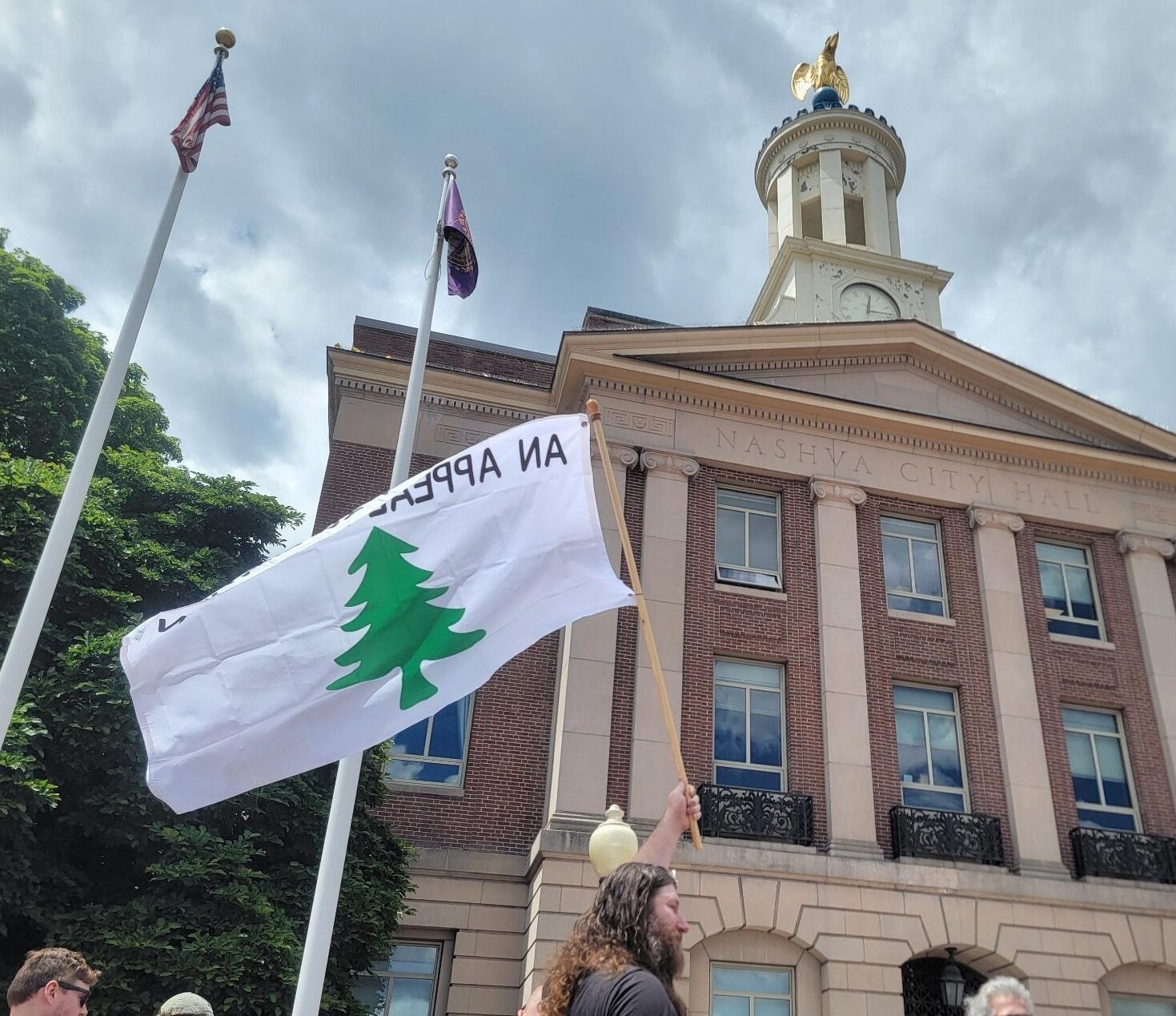It’s time to play “Taps” for Nashua’s public flagpole tradition.
After being slapped with a lawsuit over free speech violations for refusing to allow citizens to fly the historic Pine Tree Flag, Nashua Mayor Jim Donchess quietly pulled down the city’s flagpole policy earlier this week.
In a response to the lawsuit, the city told the U.S. District Court:
“On October 7, 2024, during the pendency of this action, Mayor Donchess repealed the 2022 Flagpole Policy and any other previous policies related to the flagpoles outside City Hall. In place of these policies, Mayor Donchess signed a new City Hall Flagpole Policy stating that ‘The flagpoles on city hall grounds shall henceforth be exclusively controlled by city government. The city shall determine what flags will be flown and during what time periods and does not seek input from other sources. The flagpoles are not public fora open to others for expression but are solely for city government to convey messages it chooses.’”
(The city’s new flagpole policy can be found here.)
For years the City of Nashua had a policy of making a flagpole at City Hall available, upon request, to citizens who wanted to celebrate or demonstrate on behalf of an idea or group. In the past, that included the flags of Ireland, India, and Ukraine, along with the “Suffrage” flag, the “Children of the American Revolution” flag, and the Lion’s Club flag.
What the city would not allow was the flying of a flag promoting women’s rights/girls-only sports or the historic “Appeal to Heaven” Pine Tree Flag. The pine tree symbol is tied to the Pine Tree Riot in Weare, N.H. Some historians believe a version of the flag flew over Gen. George Washington’s army at the historic Battle of Bunker Hill.
Nashua resident and political activist Beth Scaer told the city she wanted to fly the flag to commemorate the anniversary of the Bunker Hill battle, in which several New Hampshire residents took part. The city refused.
“The flag is not in harmony with the message that the city wishes to express and endorse. Therefore, we must deny your request,” wrote Jennifer L. Deshaies, whose job title in the Donchess administration is “Risk Manager.”
Just days later, Donchess and his administration pulled down the New Hampshire state flag and replaced it with the “Progress Pride” flag.
Told of the city’s decision to wave the white flag on its flagpole policy rather than allow her to fly the Pine Tree banner, Scaer told NHJournal she was “disappointed that Nashua abruptly changed its flag policy instead of addressing how they used it to discriminate against certain viewpoints.
“However, I feel this sudden shift validates our position. By scrapping their old policy entirely, the city has essentially admitted that it violated our First Amendment rights. The city’s actions have only strengthened our resolve to see this through.”
Scaer is being represented in the lawsuit by the Institute for Free Speech (IFS), which advocates for First Amendment rights in cases across the country.
“The abrupt repeal of Nashua’s flag policy is a tacit admission that the old policy was unconstitutional,” IFS attorney Nathan Ristuccia told NHJournal.
“This last-minute change is a transparent attempt to avoid judicial scrutiny and sidestep the serious constitutional issues raised by Nashua’s actions toward our clients. We look forward to continuing to litigate this matter and working to protect every citizen’s right to free speech in the public square.”
The IFS is also representing the families in the lawsuit against Bow High School over punishing parents who wore pink wristbands with XX written on them at a soccer game to indicate their opposition to allowing biological males to play on girls sports teams.
One former free speech organization that has not publicly taken a position on either case is the ACLU of New Hampshire. Its legal director, Gilles Bissonnette, declined to respond to multiple requests for comment on the two cases.
Steven A. Bolton, the city’s corporation counsel, denied that the mayor had made any change to the city’s flagpole policy, despite the city itself calling it a “new City Hall flag pole policy.”
“I don’t agree that we’ve ended any tradition. The mayor’s policy is intended to make it clear that this is, and has always been, a city flagpole. We are merely clarifying the existing policy,” Bolton told NHJournal.
Bolton confirmed the “clarification” was in response to the lawsuit, but he denied that it bolsters the argument that the previous policy violated the First Amendment.
“The policy now is what the policy is now,” Bolton said.


